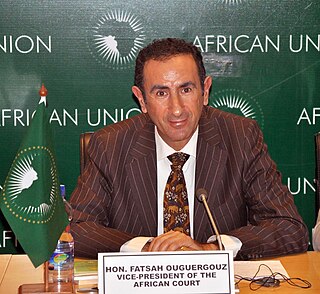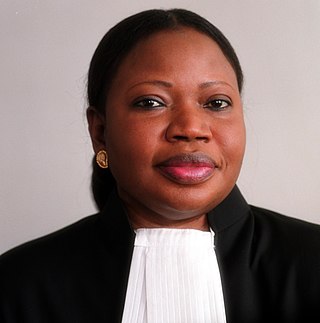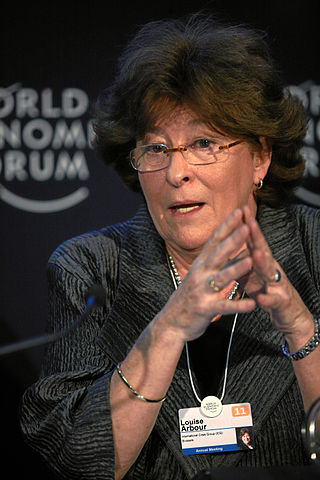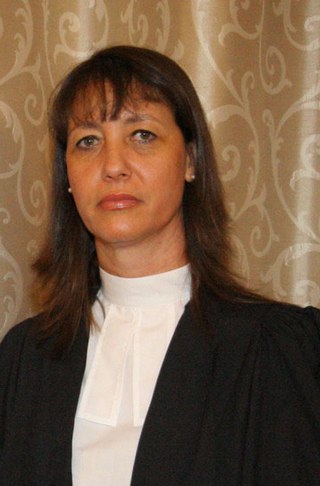Related Research Articles
Shiranee Tilakawardane is a former puisne justice of the Supreme Court of Sri Lanka and a member of the Judicial Service Commission. She has also served as acting chief justice when Mohan Peiris was out of the country.

Fatsah Ouguergouz is an Algerian judge born in France.

Sophia Abena Boafoa Akuffo was the Chief Justice of Ghana from 19 June 2017 until 20 December 2019. She had been a Judge in the Supreme Court of Ghana since 1995.

Fatou Bom Bensouda is a Gambian lawyer and former Prosecutor of the International Criminal Court (ICC), who has served as the Gambian High Commissioner to the United Kingdom since 3 August 2022.
Hilary Christiane Mary Charlesworth is an Australian international lawyer. She has been a Judge of the International Court of Justice since 5 November 2021, and is Harrison Moore Professor of Law and Melbourne Laureate Professor at the University of Melbourne, and Distinguished Professor at the Australian National University.

The Centre for Human Rights at the University of Pretoria Faculty of Law, South Africa, is an organisation dedicated to promoting human rights on the continent of Africa. The centre, founded in 1986, promotes human rights through educational outreach, including multinational conferences, seminars and publications such as Human Rights Law in Africa, The African Human Rights Law Journal, the African Human Rights Law Reports and The Constitutional Law of South Africa. The centre, which was founded during Apartheid, assisted in adapting a Bill of Rights for South Africa and contributed to creating the South African Constitution. In 2006, the centre received the UNESCO Prize for Human Rights Education, particular recognising for the LLM in Human Rights and Democratisation in Africa and the African Human Rights Moot Court Competition.
Since the December 2010 revolution in Tunisia and protests across the Middle East and North Africa (MENA) began, Tunisian women have played an unprecedented part in the protests. Habib Bourguiba began instituting secular freedoms for women in 1956, such as access to higher education, the right to file for divorce, and certain job opportunities. Women in Tunisia enjoy certain freedoms and rights that are denied to women in neighboring countries, although the social norms have shifted since 2011.

Women in law describes the role played by women in the legal profession and related occupations, which includes lawyers, paralegals, prosecutors, judges, legal scholars, law professors and law school deans.

Mathilda Twomey is a Seychellois lawyer and academic. She is the first female judge in the history of Seychelles and also the first woman to be appointed Chief Justice of the Supreme Court of Seychelles.

The following is a timeline of intersex history.
Lillian Tibatemwa-Ekirikubinza is a Ugandan lawyer, academic and judge, who has served as a Justice of the Supreme Court of Uganda, since 2015.
Marie Thérèse Mukamulisa is a Rwandan jurist who was appointed to a six-year term on the African Court on Human and Peoples' Rights in 2016.
Tujilane Rose Chizumila is a Malawian lawyer and jurist who was appointed to the African Court on Human and Peoples' Rights for a six-year term in 2017.
Solome Balungi Bossa, , is a Ugandan judge on the International Criminal Court (ICC). Prior to her election to the ICC, she was a member of the Court of Appeal in Uganda, which also doubles as the Constitutional Court in the Judiciary of Uganda. She was elected to a nine-year term on 5 December 2017 and was sworn in on 9 March 2018. Previously she was appointed to a six-year term on the African Court on Human and Peoples' Rights in 2014.
Eusebia Munuo is a Tanzanian jurist who was a Judge of the Court of Appeal of Tanzania and served as president of the International Association of Women Judges from 2012 to 2014.

Reine Adélaïde Sophie Alapini-Gansou is a Beninese jurist who is a judge of the International Criminal Court since March 2018.

Marcia Vaune Jocelyn Kran is a Canadian lawyer and expert member of the UN Human Rights Committee. Kran's career has spanned international human rights law, criminal law and political science for over forty years, and includes positions in academia and civil society. Kran has held a range of senior United Nations positions including in international human rights law.
Domitille Barancira is a Burundian judge who chaired the Constitutional Court from 1998 until 2006. She subsequently served as Burundi's ambassador to Germany.
Elizabeth Gwaunza is a Zimbabwean lawyer and jurist who has been Deputy Chief Justice of the Supreme Court of Zimbabwe since March 2018.
References
- 1 2 3 4 "Justice Bensaoula Chafika - Algeria". African Court on Human and Peoples' Rights. Archived from the original on 2017-11-15. Retrieved 2017-09-28.
- ↑ "Second International Conference for a Euro-Mediterranean Community of International Arbitration". UNCITRAL. 12 November 2015. Retrieved 28 September 2017.
- ↑ "INCB Watch April 2016 - Elections at the International Narcotics Control Board 2016". International Drug Policy Consortium. 1 April 2016. Retrieved 28 September 2017.
- ↑ "Annual Report" (PDF). International Institute for Justice and the Rule of Law. 2016. Archived from the original (PDF) on 2017-09-29. Retrieved 2017-09-28.
- ↑ "Two New Judges Appointed to the African Court on Human and Peoples' Rights". African Union. 3 February 2017.
- ↑ "African rights court gets more female judges". The New Times. 8 February 2017. Retrieved 28 September 2017.
- ↑ Ettouahria, Samila (9 March 2017). "Journée internationale des femmes : Une juge algérienne à la Cour africaine des droits de l'homme". El Moudjahid (in French). Retrieved 28 September 2017.
- ↑ "African Women Judges and Gender Parity on the African Court on Human and Peoples' Rights". GQUAL. 6 February 2017. Retrieved 23 September 2017.
- ↑ "Two new female judges sworn-in at the African Court on Human and People Rights". Kenyan Woman. 10 March 2017. Retrieved 23 September 2017.